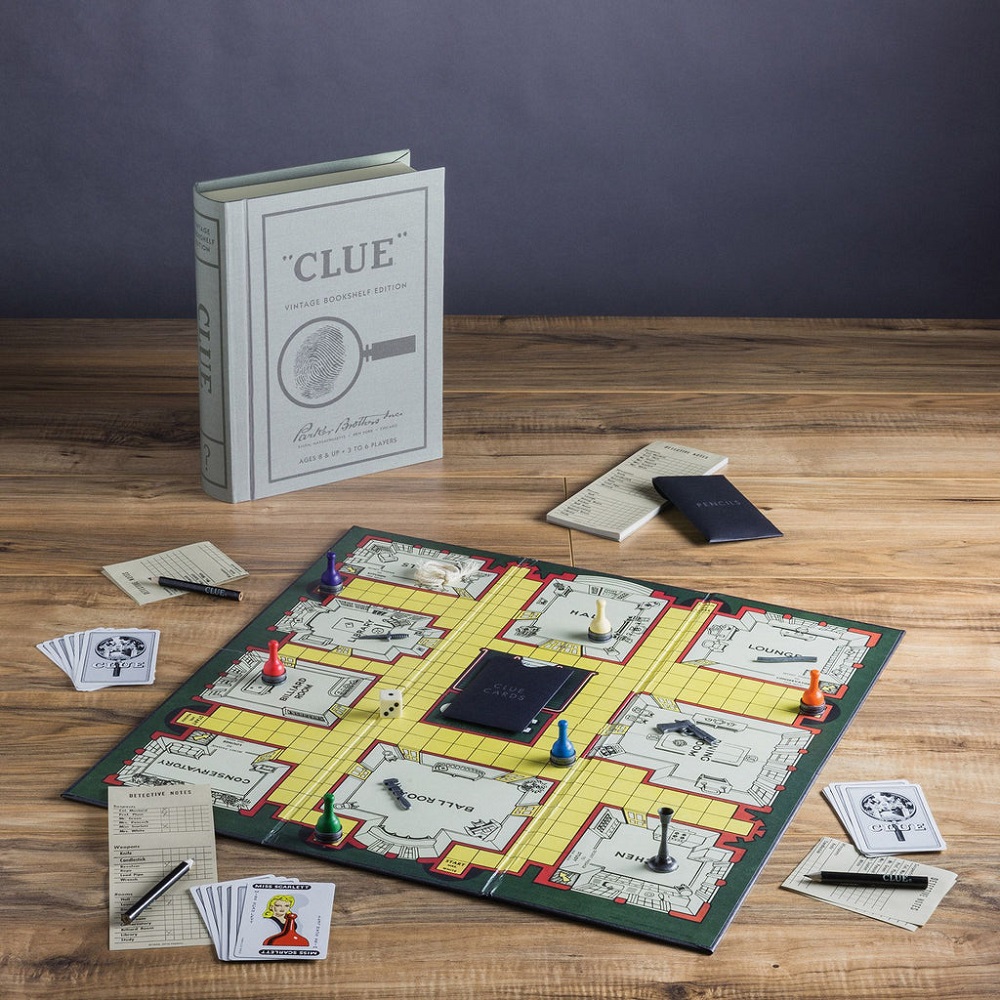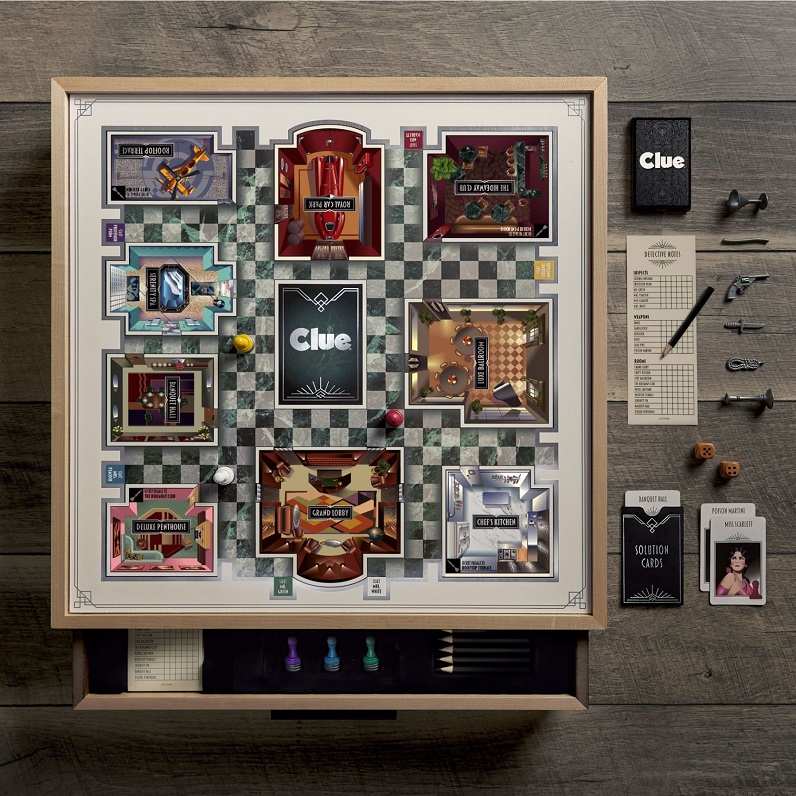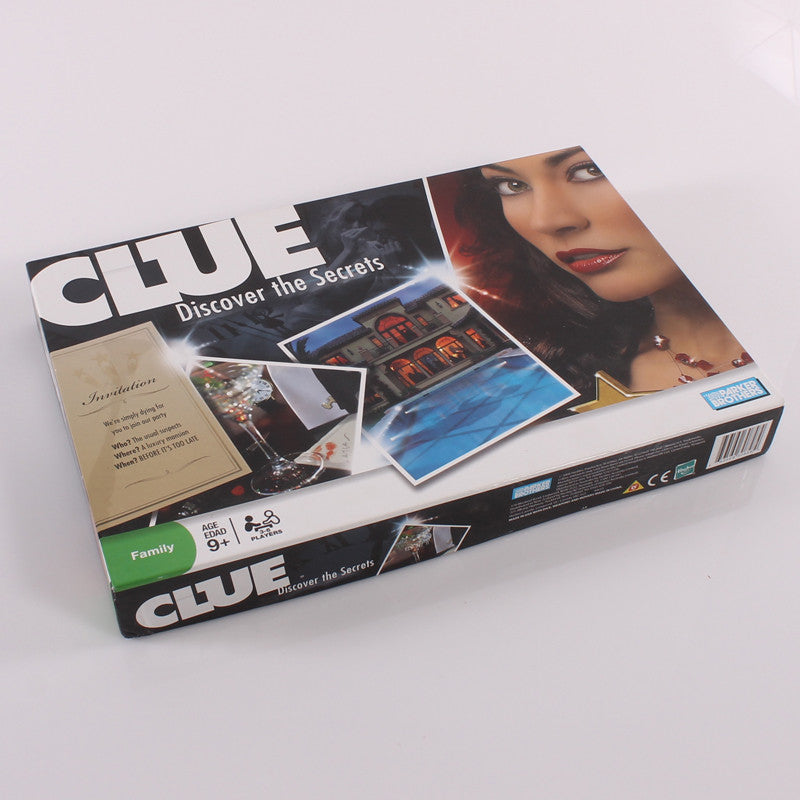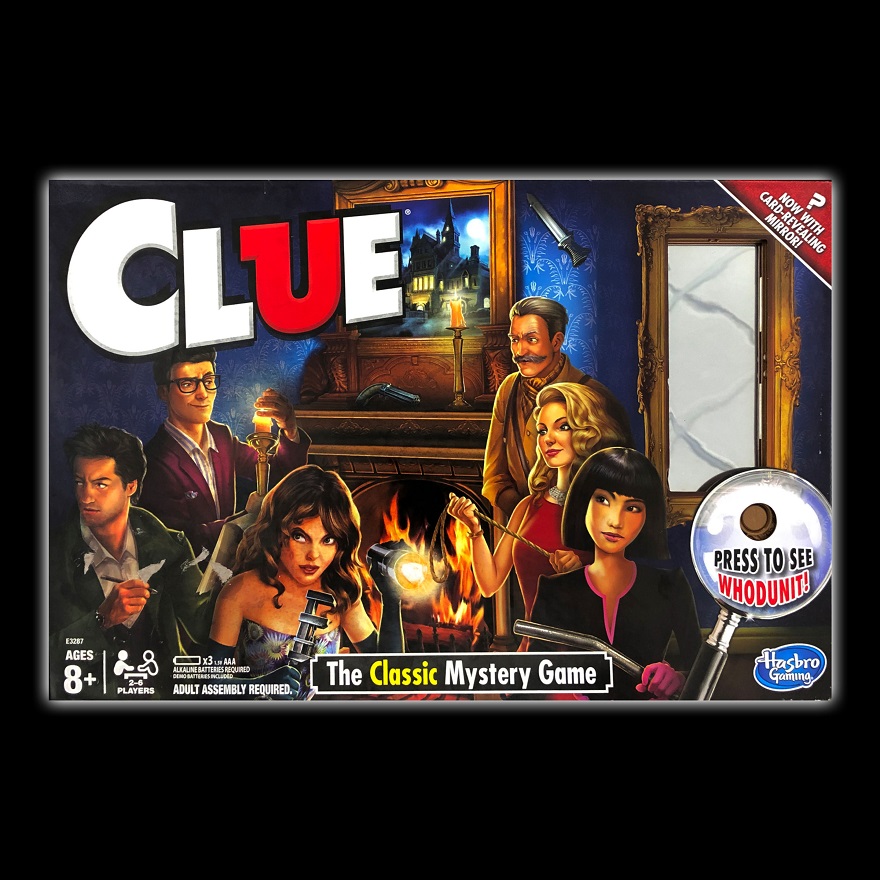Introduction to Clue: Basics of the Board Game
Clue is a classic mystery board game. It takes players on a detective journey to solve a murder. In this game, players must figure out three key details: the murderer, the weapon, and the crime scene. Each player takes on the role of one of the game’s six characters. These characters weave their way through the rooms of a mansion on the game board. Every room is a potential crime scene. Players take turns moving from room to room. They collect clues that will help them make an accurate accusation.
To start the game, you must set up the board. It has nine rooms, six weapons, and six character tokens. Cards that represent characters, weapons, and rooms are also part of the setup. Each game begins with the selection of one card from each category. These cards are hidden from players and represent the actual crime details. Players are dealt the remaining cards, starting their investigation with some initial clues.
The goal in Clue is to use deductive reasoning to solve the mystery. You need to outsmart other players with clever guesswork and strategic thinking. Learning how to play the Clue board game efficiently is essential for winning. With sharp observation skills and a bit of luck, anyone can become a master at Clue. We’ll delve into the rules and how to maximize your chances of solving the mystery in the upcoming sections.

Setting Up the Game: Components and Preparation
Before you dive into the intriguing world of Clue, ensuring a proper setup is crucial. Here’s how to get started:
- Find a Playing Surface: First, select a comfortable and spacious area. A large table works best.
- Place the Game Board: Lay the Clue board game flat so all players can easily reach it.
- Sort the Cards: There are three types of cards – characters, weapons, and rooms. Shuffle each pile separately.
- Choose the Crime Details: Without looking, pick one card from each category. These are hidden in the confidential envelope.
- Distribute Remaining Cards: Deal out the rest of the cards to the players, keeping them secret.
- Set the Weapons: Place the six miniature weapons randomly in the different rooms of the mansion.
- Position the Characters: Each player selects a character token and puts it in the starting square.
- Gather Notepads and Pencils: Recording clues is essential. Make sure each player has something to write on.
- Assign a Detective: It can be helpful to have one player act as a lead note-taker or referee.
This setup forms the foundation of learning how to play the Clue board game effectively. With these components in place and preparation complete, you’ll be on your way to solving the mystery that lies at the heart of this captivating game.
The Rules of Engagement: How to Play Clue
Understanding the rules is key to mastering how to play the Clue board game. Start with the first player. They roll the dice and move their character token. The number on the dice decides how far they go. Aim to enter a room on your turn. Once inside, suggest a suspect, weapon, and room. Now, the interrogation begins.
Player Actions on a Turn
- Roll the Dice: Decide your movement by rolling the dice.
- Move Your Token: Try to enter a different room each turn if possible.
- Make a Suggestion: Combine a suspect, weapon, and the room you’re in.
- Listen to Others: Pay attention when players show you a card to refute your suggestion.
Interrogation Process
When you make a suggestion, the player to your left must try to disprove it. They show you one of their cards if it matches your suggestion. If they can’t show you a card, the next player tries. This goes on until someone shows you a card or no one can. Each card shown is a piece of the puzzle. Write down what you see; it’s critical.
Making an Accusation
After collecting clues, you may be ready to accuse. Accuse when it’s your turn and you’re sure of the facts. State your chosen suspect, weapon, and room. Check the confidential envelope. If you’re right, you win. But be careful; a wrong accusation means you can’t win anymore.
Winning the Game
To win at Clue, be the first to make the correct accusation. Use your notes and memory to track which cards players have shown. Smart suggestions and keen observation skills will guide you. Solid deductions and a bit of luck can make you a Clue champion.
Playing Clue is about strategy, wit, and observation. Keep the rules in mind, think ahead, and watch every move. The answer to the mystery is in the cards. Your task is to find it before the others do.
Effective Strategies for Winning the Game
Winning the Clue board game is not just about luck. It demands strategy and thought. Improve your gameplay with these tested strategies:
- Early Movement: Aim to enter rooms quickly. More rooms mean more suggestions to make.
- Diversify Suggestions: Mix up your guesses. Suggest different suspects and weapons to gather a wide range of information.
- Track Everything: Write down every clue. Note who shows what card, and who passes.
- Use Process of Elimination: Cross off items you have seen. Narrow down possibilities.
- Pay Attention: Watch the reactions and notes of others. They can give away hints.
- Choose Your Route Wisely: Plan your moves to enter new rooms and make fresh suggestions.
- Smart Accusations: Only make an accusation when you are very sure. A wrong guess means you’re out.
These strategies will put you on the path to victory. Remember, combining keen observation with logical deduction is the key to mastering how to play the Clue board game. Stay focused and one step ahead of the other detectives to solve the crime first.
Common Mistakes to Avoid in Clue
To excel in how to play the Clue board game, it’s not just about what you should do, but also about what you shouldn’t. Paying attention to common pitfalls can dramatically increase your chances of victory. Here are some key mistakes to steer clear of:
- Ignoring the Notebook: Not recording every clue is a top mistake. Use your notebook to track clues.
- Being Predictable: Repeating the same suggestions limits your information gathering. Vary your accusations.
- Forgetting to Bluff: Sometimes, mislead others with your suggestions. Keep your true deductions secret.
- Neglecting Other Players: Overlooking other players’ moves and notes might cause you to miss valuable clues.
- Jumping to Conclusions: Don’t rush to make an accusation without solid evidence. A wrong accusation could put you out of the game.
- Inefficient Movement: Wasting turns moving aimlessly prevents you from entering rooms and making suggestions.
- Disregarding Strategy: Playing without a plan is risky. Think ahead and strategize each move carefully.
By avoiding these errors and applying effective strategies, you enhance your gameplay in how to play the Clue board game. Keep these in mind, and you’ll be less prone to getting derailed on your way to solving the mystery.
Tips for Interrogation and Making Accusations
As you dive deeper into how to play the Clue board game, your interrogation and accusation skills become critical. Here are some focused tips to master these aspects:
- Start with Strong Suggestions: Lead with suggestions you feel are likely, based on your clues.
- Read the Room: Observe players’ reactions when you or others make suggestions.
- Think Before You Speak: Make sure each suggestion is strategic and helps you gather new information.
- Question Quietly: Don’t give away too much. Ask in a way that reveals others’ cards without exposing your knowledge.
- Bluff Wisely: Sometimes, throw in a red herring to confuse others.
- Accuse with Confidence: Only accuse when you’re almost certain. Check your notes twice, then decide.
- Take Notes After Accusing: Keep track of the game even if your accusation was incorrect. You can still learn from others.
These interrogation and accusation techniques are vital for anyone learning how to play the Clue board game well. By following these tips, you’ll be able to make more informed decisions and move closer to victory.
Advanced Techniques for Deductive Reasoning
To become an ace at Clue, sharpen your deductive reasoning with these advanced techniques:
- Observe Patterns: Notice how players handle their cards and what they suggest. Patterns may emerge.
- Question Suggestively: Use your suggestions to test theories. See how others respond.
- Focus on Elimination: Work to eliminate options methodically. Fewer possibilities mean a clearer path to the solution.
- Control the Narrative: Steer the game’s flow with your suggestions. Influence others discreetly.
- Leverage the Secret Passage: Use the board’s secret passages to move quickly. Stay ahead in the race for clues.
- Time Your Questions: Ask about the cards you want to check when it’s optimal. Timing is key.
- Predict Possibilities: Anticipate the cards in play. Use the process of elimination and your notes to guess.
By applying these tactics, you enhance your investigative prowess in how to play the Clue board game. Keep all clues and observations in mind, and you’ll craft a roadmap to solving the mystery.
Practice Makes Perfect: Ways to Sharpen Your Skills
The key to mastering how to play the Clue board game lies in practice and refinement of your detective skills. Here are practical ways to enhance your gameplay:
- Rehearse with Friends: Regularly play Clue with friends to get comfortable with the flow of the game.
- Solo Simulations: Set up mock games alone. Act as multiple players to challenge your reasoning.
- Review Past Games: Look back at games you’ve played. Identify what worked and what didn’t.
- Mind Puzzles: Do brain teasers and logic puzzles. They improve problem-solving and deduction.
- Watch Expert Players: Observe skilled players. Learn from their moves and strategies.
- Join Online Communities: Engage with other Clue enthusiasts online. Share tips and discuss strategies.
- Teach the Game: Explain how to play the Clue board game to others. It deepens your understanding.
By incorporating these practices into your routine, you’ll find yourself becoming more adept at making accurate deductions and winning the game. Remember, every game is a learning opportunity. Use each session of Clue to fine-tune your strategies and sharpen your detective instincts. With time and dedication, you’ll not only enjoy playing Clue but also become the player everyone looks to beat.


